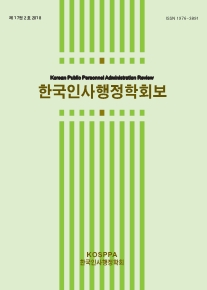이 연구는 공공영역의 업무에 종사하는 MZ공무원들이 실제로 스마트워크를 잘 활용하고 있는지 공공부문에서의 스마트워크에 대한 인식은 어떠한지에 대해 탐구한다. “90년대생이 온다”로 대변되는 MZ세대의 강조된 특성이 코로나로 인한 비대면업무의 증가로 인한 스마트워크활용 증가의 기대와 어떻게 실제로 공공영역의 현장에서 공무원들에게 인식되고 있는지 실증적으로 알아보고자 하였다. 분석방법으로는 공공부문 MZ세대 대상 FGI 2회와 행정안전부 공무원 226명 대상 스마트워크 관련 설문조사를 진행하여 집단간 t-test와 조절회귀분석을 시행하였다. 분석 결과, MZ세대와 기타세대 모두 세대 간에 스마트워크 적응력과 선호도에서 차이가 난다고 인식하고 있었으며, MZ세대가 그 차이를 유의미하게 높게 인식하고 있었다. MZ세대는 기타세대에 비해 재택근무와 모바일 전자결재의 만족도가 높았고, 스마트워크가 업무프로세스 단축과 유연한 조직문화에 기여한다고 인식하고 있었다. 스마트워크 공정성에 대한 세대 간 유의미한 차이는 나타나지 않았다. 인터뷰에서 스마트워크 효과성에 영향을 줄 것으로 꼽힌 요인 중 스마트워크 재량권, 혁신행동, 공공봉사동기가 유의미한 정(+)의 영향력을 보였다. 결론적으로는, 혁신에 대한 성향이 높을수록 스마트워크 활용의 기대가 큰 것을 재확인 하여 공공영역에서도 스마트워크를 활용하여 업무혁신을 이룰 수 있도록 고민해야 한다는 정책적 시사점이 도출되었다.
This study explores whether MZ officials in the public sector are making good use of smartwork and how they perceive smartwork in the public sector. We tried to empirically find out the expectations of an increase in smartwork use due to the increase in remote work in COVID-19. Two FGI surveys for the MZ generation in the public sector and a survey to 226 public officials from the Ministry of Public Administration and Security were used to conduct intergroup t-test and moderated regression analysis. As a result, both the MZ generation and other generations recognized a difference in smartwork adaptability and preference between generations, and the MZ generation recognized the difference significantly higher. The MZ generation had higher satisfaction with telecommuting and mobile authorization than other generations and recognized that smartwork contributes to faster work processes and more flexible organizational culture. There was no significant difference between generations in smartwork fairness. Smart work discretion, innovation behavior, and public service motivation showed significantly positive influence on smartwork effectiveness. In conclusion, policy implications were drawn that the higher the tendency to innovate, the higher the expectation for smartwork use, and that workplace innovation by using smartwork institutions in the public sector is possible in the future.
Ⅰ. 서론: 스마트워크와 MZ세대의 어울림(fit)은 어떠한가?
Ⅱ. 선행연구
Ⅲ. FGI를 통한 스마트워크 효과성 영향요인의 도출
Ⅳ. 연구방법
Ⅴ. 분석 및 결과
Ⅵ. 결론 및 시사점
참고문헌
(0)
(0)
